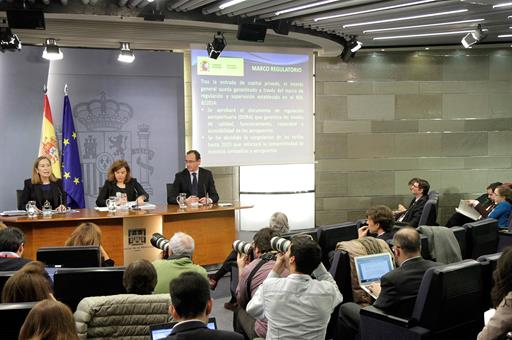Moncloa Palace, Madrid
The Council of Ministers has authorised the disposal of shares of AENA S.A., through an Initial Public Offering (IPO). AENA is the leading airport operator in the world, with almost 196 million passengers in 2014; it runs 46 airports, two heliports and participates in the management of another 15 airports around the world.
The Vice-President of the Government, Soraya Sáenz de Santamaría, highlighted that the entry of private capital has been made possible following "a profound transformation of the company that has resulted in it being profitable for the first time ever".
The Minister for Public Works, Ana Pastor, specified that the situation at the start of the legislature was "quite frankly delicate", but improved business management has enabled gross operating profit to double - from 883 million euros in 2011 to 1.6 billion by the end of 2013 - as well as costs to be reduced by more than 255 million euros. "We have moved from being in the red to a very positive balance".
Ana Pastor added that the cash generation has improved. "There were no funds to pay wages, but we have now moved to a positive balance of 846 million euros". In the first nine months of 2014, the cash generation stood at 1 billion euros.
The government agreed on 13 June 2014 (Royal Decree Law 8/2014) to the entry of 49% of private capital in AENA in two stages: on 11 July, it authorised 21% of the capital to external key investors and on Friday it approved the floatation of the remaining 28% through an Initial Public Offering (IPO).
AENA to remain a public enterprise
The Minister for Public Works announced that the company will register the IPO prospectus on Friday with the Spanish Securities Market Commission for the floatation on 11 February. She also highlighted that AENA will continue to be a public enterprise. "51% of the capital remains with the State and all the professionals that work at AENA will continue to be public servants".
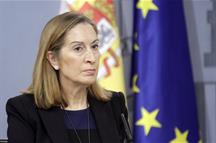 Pool MoncloaAccording to the minister, the presence of private investors will help strengthen the management of the company, the future sustainability of the model and will enable Spain to have the leading airport operator in the world. "The network will be strengthened, it will be given more powers and guarantee that Spain does not break up its airport network in the future".
Pool MoncloaAccording to the minister, the presence of private investors will help strengthen the management of the company, the future sustainability of the model and will enable Spain to have the leading airport operator in the world. "The network will be strengthened, it will be given more powers and guarantee that Spain does not break up its airport network in the future".
In this regard, she quoted that the mobility of the citizens of the island of El Hierro is thus guaranteed, as well as the autonomous cities of Ceuta and Melilla because they also have their own airports.
Ana Pastor added that we can enhance the viability of AENA as an airport operator because "we have a great network that contributes in a decisive manner to the wealth of our country, and to the generation of direct and indirect employment".
Freezing of airport charges
Ana Pastor said that following the entry of private capital, the general interest will be guaranteed through a regulatory and supervisory framework.
She also announced that airport charges will be frozen. "Other operators have not done this. Spain has done this and, moreover, this freezing of the charges will last through to 2025".
She also reported that reservations for the winter season have grown on last year and the number of passengers flying is maintaining sustained growth.
Greater air safety
On matters of public works, the government approved the State Operational Safety Programme (Spanish acronym: PESO) for civil aviation, with the aim of strengthening air safety through the adoption of a new preventative focus on this issue.
The Minister for Public Works pointed out that Spain is one of the first countries to adopt this. Airlines and all other sector operators have contributed to this preventative programme. The aim is to reduce the number of incidents as far as possible. "The essence of the model is that prevention is much better than cure", she stated.
Social Agenda
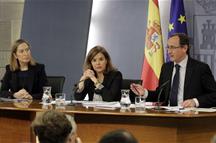 Pool MoncloaThe Council of Ministers also approved two draft laws which, in the words of the Vice-President of the Government, "constitute major progress on the Social Agenda, which is one of the pillars of the actions under the reform programme of the government for the coming months". It approved the Draft Laws on Volunteer Work and Social Action for the Third Sector, through which it "seeks to modernise and strengthen Spanish supportive action and its commitment to equality and social justice", according to Soraya Sáenz de Santamaría.
Pool MoncloaThe Council of Ministers also approved two draft laws which, in the words of the Vice-President of the Government, "constitute major progress on the Social Agenda, which is one of the pillars of the actions under the reform programme of the government for the coming months". It approved the Draft Laws on Volunteer Work and Social Action for the Third Sector, through which it "seeks to modernise and strengthen Spanish supportive action and its commitment to equality and social justice", according to Soraya Sáenz de Santamaría.
The Vice-President of the Government highlighted that there are six million volunteers in Spain and 30,000 social institutions. Under the new legislation, "the rights and obligations of volunteers and the role of these organisations are stepped up in terms of the design and implementation of policies aimed at the most needy groups".
In turn, the Minister for Health, Social Services and Equality, Alfonso Alonso, stressed that these two laws are the result of dialogue and consensus with the sectors involved and form part of "the government's actions geared towards bolstering the basic structures for social protection in Spain".
Along the same lines, Alfonso Alonso commented that the structural reforms undertaken during the course of this legislature have enabled "the Welfare State's pillars to be reinforced", as have the measures included in the recent tax reform in favour of those people with the least resources and their families. In this regard, the minister pointed out that in the first two weeks of this year, more than 90,000 applications have been received for eligibility to this aid for families and persons with disabilities.
Third Sector of Social Action
The Law on the Third Sector of Social Action seeks to boost and enhance the ability of these not-for-profit private social institutions deriving from citizen or social initiatives that strive to achieve general interest objectives through solidarity and participation to interact with the public administration services, explained Soraya Sáenz de Santamaría. She went on to say that as a result of this normative framework, it will be possible to participate in the creation and oversight of the policies aimed at fighting against poverty and social exclusion.
Alfonso Alonso commented that these institutions, which employ some 635,000 people and attend to more than five million Spaniards, "will have a specific legal regime through a nationwide law for the first time".
The new legislation establishes the civic participation of the Third Sector in public social action policies, and obliges the government to approve a programme to boost these institutions and ensure that payment obligations of the public authorities are comparable with those of other suppliers, within 12 months from its entry into force. The Minister for Health, Social Services and Equality expressed his desire to see the text enriched in its passage through Parliament through dialogue with the other political forces and for it be approved "as soon as possible" by Parliament.
Volunteer work
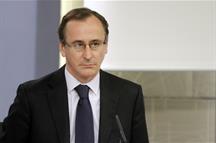 Pool MoncloaThe Law on Volunteer Work unifies very disperse legislation on the matter and modernises the current law, dating back to 1996, pointed out the Vice-President of the Government.
Pool MoncloaThe Law on Volunteer Work unifies very disperse legislation on the matter and modernises the current law, dating back to 1996, pointed out the Vice-President of the Government.
Alfonso Alonso explained that more than 40% of volunteer workers in Spain are under the age of 34, which shows the "human capital" of the Spanish youth, although voluntary work is also increasing among those over the age of 65. The new law, he highlighted, defines voluntary work - which must be free and unpaid, and cannot replace remunerated work - distinguishes it from other forms of civil participation such as political parties and trade unions, and establishes the rights and obligations of volunteers and beneficiaries, which will result in greater legal protection.
The text regulates a key element in the relationship between the volunteer and the collaborating institution: the incorporation agreement, "which is the contract between the person offering their time and the institution that has designed the project, and a specific programme with a goal that serves the general interest", explained the Minister for Health.
In the case of public administration services, they cannot promote initiatives that replace the public services that they are obliged to provide. They must also facilitate the adaptation of the working day so that their employees can participate in voluntary work.
Among the new features of the law, Alfonso Alonso also mentioned promoting the participation of companies and universities in voluntary initiatives and fostering the participation of young people in voluntary work, with all due guarantees. It also establishes that those sentenced for offences against minors may not participate in projects that involve relations with this group, and those sentenced for gender-based offences or domestic violence will be excluded from programmes that involve contact with families, women and young people.
Negotiations with United States over Morón Air Base
The Council of Ministers authorised negotiations between Spain and the United States with the aim of conditioning the permanent deployment of a crisis response military force at Morón de la Frontera Air Base (Seville). The temporary deployment of this force was authorised on 19 April 2013.
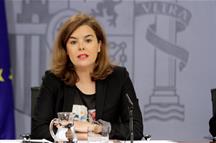 Pool MoncloaThe Vice-President of the Government declared that by establishing this contingent, the idea is "to strengthen control, dissuasion and emergency action, if necessary, in an absolute priority area for the security of our partners and neighbours, as well as for Spain, and in a key region for maintaining global peace and stability".
Pool MoncloaThe Vice-President of the Government declared that by establishing this contingent, the idea is "to strengthen control, dissuasion and emergency action, if necessary, in an absolute priority area for the security of our partners and neighbours, as well as for Spain, and in a key region for maintaining global peace and stability".
She also stressed that the negotiations tackled elements that should contribute to improving the effects of these agreements, particularly involving "employment aspects".
Isolation Ward at Central Defence Hospital
The government has agreed to set up floor 22 of the Central Defence Hospital as a high-level isolation ward designed to attend to cases of highly infectious diseases.
The Vice-President of the Government argued that the aim is to "strengthen, improve and modernise an already-existing unit to provide the national defence service and the National Health System with highly necessary healthcare resources.
Soraya Sáenz de Santamaría clarified that this will not exclusively be a facility for Ebola-related cases, but will also be highly useful for tackling any need related to this disease. "This forms part of the obligation on our armed forces to be prepared for any eventuality, and that rare diseases do not constitute a minor risk".
Current affairs
In response to questions from journalists, interested in discovering whether the crisis over the two-party system could affect stability in Spain, the Vice-President of the Government underlined that "political stability is also reflected on the stock exchange", since it means confidence, and it is what has enabled Spain, over the last three years, to undertake a reform programme which is starting to show positive results. She specifically mentioned that during the past week the International Monetary Fund has only increased its forecasts for two countries: the United States and Spain, and expressly stated that these improvements are as a result of the reforms.
The figures from the Labour Force Survey (Spanish acronym: EPA) were published yesterday, which show that almost half a million people left the unemployment queues in 2014, added Soraya Sáenz de Santamaría.
As regards the possibility of early elections being called in Andalusia, the Vice-President of the Government remarked that the Regional Government of Andalusia "was born unstable", because it is governed by a party that did not win the elections - which was the PP - but by one that lost the elections - the second and third forces in number of votes. It is for the President of the Regional Government of Andalusia to call elections; however, calling early elections is always a "disaster", according to the Vice-President of the Government, because it shows that the project was not based on solid foundations.
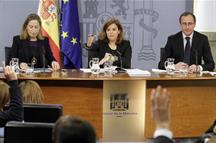 Pool MoncloaAs regards the results of the upcoming elections in Greece on Sunday, the Vice-President of the Government recalled that "whatever the outcome, agreements and commitments are made to be met".
Pool MoncloaAs regards the results of the upcoming elections in Greece on Sunday, the Vice-President of the Government recalled that "whatever the outcome, agreements and commitments are made to be met".
On the issue of Luis Bárcenas' release from prison, Soraya Sáenz de Santamaría said that it is for the courts and judges to hold trials and hand down rulings, and for the government and Parliament, through their corresponding powers, to adopt measures to avoid corruption in the future.
In this regard, the Vice-President of the Government highlighted that a democratic regeneration plan such as the one implemented during this legislature "has never before existed in Spain". She quoted the Transparency Act, the Statute on Senior Public Office, and the Economic-Financial Control of Political Parties. Furthermore, for the first time, the Criminal Code provides for the public authorities and individual citizens to recover "that which the person charged with corruption has embezzled".





